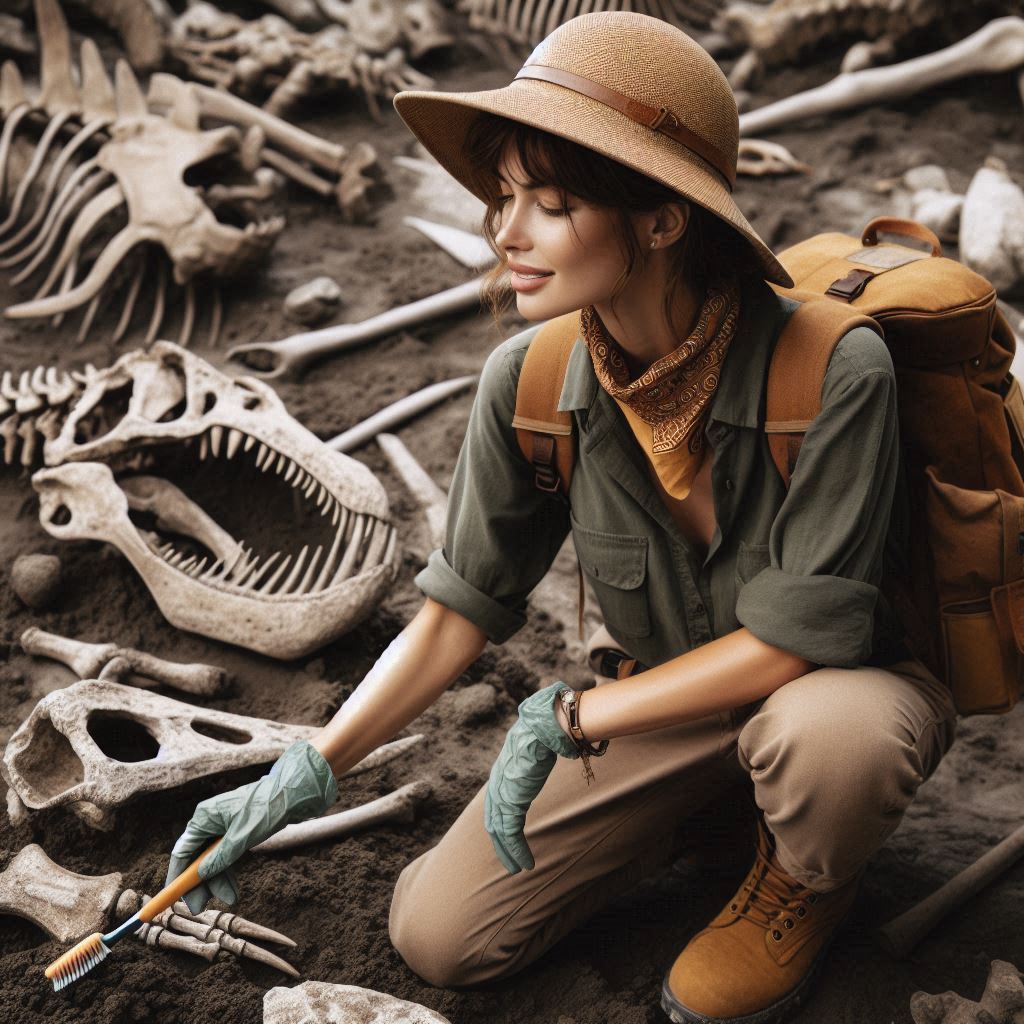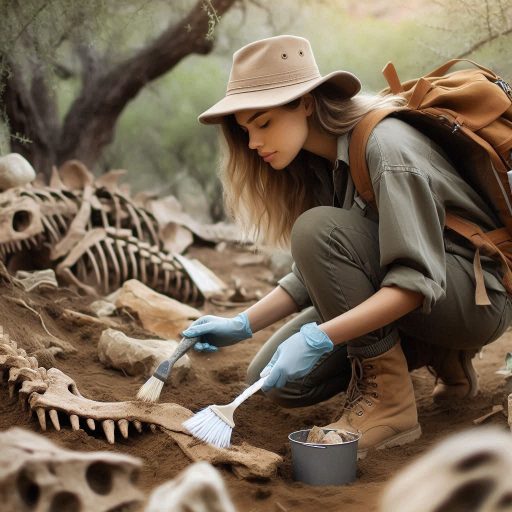Introduction
Anthropology is the comprehensive study of humans and their societies, examining the complexities of human behavior, culture, and evolution.
This discipline explores the diverse ways in which people interact with each other and their environments.
Anthropology is not limited to a single approach; instead, it encompasses various subfields that provide unique insights into the human experience.
Cultural anthropology focuses on understanding the customs, beliefs, and practices of different societies.
Archaeology uncovers the past through the study of material remains, revealing how ancient cultures lived and evolved.
Linguistic anthropology examines the role of language in shaping social life and cultural identity.
Physical anthropology, on the other hand, investigates the biological aspects of humans, including evolution and adaptation.
The importance of anthropology lies in its ability to enhance our understanding of human behavior and culture.
By studying the diverse ways in which people live and interact, anthropology fosters greater empathy and awareness of the complexities of our world.
This understanding is crucial for addressing social issues and promoting cross-cultural dialogue.
Anthropology in Business
How anthropologists work with businesses to understand consumer behavior and market trends
Anthropology plays a crucial role in the business world.
Businesses hire anthropologists to understand consumer behavior and market trends.
Anthropologists apply qualitative research methods to gather insights into consumer preferences.
They conduct in-depth interviews and ethnographic studies to reveal hidden motivations.
This approach provides companies with valuable information for strategic decision-making.
Examples of how anthropological research has helped companies in product development and marketing strategies
For instance, consider the case of Procter & Gamble (P&G).
The company employed anthropologists to study how families use their products.
Researchers observed household routines and discovered new ways to improve existing products.
This ethnographic research led to innovations like the Swiffer, a cleaning product that met specific consumer needs.
Another example involves the clothing retailer Levi Strauss & Co.
The company hired anthropologists to investigate how people wear jeans in different cultures.
This research provided insights into regional preferences and styles.
As a result, Levi’s could tailor its marketing strategies for various markets, increasing customer satisfaction.
The role of anthropologists in conducting cross-cultural research to aid in global business operations
Anthropologists help companies understand the cultural context of their products.
They analyze consumer behavior across different demographics, considering factors like age, ethnicity, and lifestyle.
This research enables businesses to develop targeted marketing campaigns that resonate with specific audiences.
Companies can create messages that reflect cultural values and preferences, increasing their appeal.
Cross-cultural research is particularly important for global business operations.
As companies expand internationally, they face diverse cultural landscapes.
Anthropologists conduct research to identify local customs and consumer habits.
This knowledge helps businesses avoid cultural misunderstandings and adapt their strategies accordingly.
For example, McDonald’s has successfully entered markets worldwide by customizing its menu to local tastes.
In India, they introduced vegetarian options to cater to cultural preferences.
Anthropologists helped the company understand local dietary restrictions and preferences, ensuring their offerings align with consumer expectations.
Moreover, anthropologists play a role in enhancing customer experience.
They analyze how consumers interact with products and services.
This research informs companies about areas for improvement in design and functionality.
By understanding user experience, businesses can create products that better meet consumer needs.
In summary, anthropology significantly impacts the business world.
Anthropologists provide insights into consumer behavior, aiding companies in product development and marketing strategies.
Their expertise in cross-cultural research supports global business operations, ensuring companies succeed in diverse markets.
As businesses continue to evolve, the role of anthropologists will remain vital in navigating the complexities of consumer preferences and market dynamics.
Embracing anthropology can lead to innovation and sustainable growth in the ever-changing business landscape.
Anthropology in Healthcare
How anthropologists contribute to the healthcare sector by studying cultural beliefs and practices related to health and illness
Anthropologists play a vital role in the healthcare sector by studying cultural beliefs and practices related to health and illness.
They investigate how different communities perceive health, disease, and healing.
By understanding these cultural perspectives, anthropologists can provide healthcare professionals with valuable insights.
This understanding helps clinicians design interventions that respect and align with patients’ cultural contexts.
For example, anthropologists conduct ethnographic studies in various communities to explore traditional healing practices.
These studies reveal how cultural rituals and beliefs shape health behaviors.
By incorporating this knowledge, healthcare providers can better engage with patients and create culturally relevant treatment plans.
The importance of cultural competence in healthcare delivery and the role of anthropologists in promoting it
Cultural competence is essential in healthcare delivery.
It allows providers to effectively communicate and interact with patients from diverse backgrounds.
Anthropologists promote cultural competence by educating healthcare professionals about different cultural norms and values.
They facilitate training sessions that enhance understanding of the cultural factors influencing health behaviors.
By promoting cultural competence, anthropologists help reduce health disparities.
They enable providers to offer more effective care by fostering trust and respect between patients and clinicians.
This approach leads to better patient satisfaction and adherence to treatment plans.
Anthropological insights have significantly improved health outcomes in diverse communities
For instance, in the U.S., anthropologists have worked with Native American populations to address health issues related to diabetes.
They conducted research to understand traditional diets and cultural practices.
This understanding helped healthcare providers develop interventions that respected cultural preferences while promoting healthier eating habits.
Another example involves anthropologists collaborating with public health officials to address maternal and child health in African communities.
They studied local beliefs around childbirth and child-rearing practices.
By incorporating these insights into health programs, officials were able to design initiatives that resonated with the community.
This approach led to increased participation in maternal healthcare services and improved health outcomes.
Additionally, anthropologists have contributed to understanding the spread of infectious diseases.
During the Ebola outbreak in West Africa, they studied local customs surrounding burials.
Their findings informed public health messaging and intervention strategies, which helped reduce transmission rates.
By addressing cultural practices, healthcare providers could implement effective prevention measures.
Anthropologists significantly enhance the healthcare sector by studying cultural beliefs related to health.
Their work promotes cultural competence among healthcare providers, improving patient-provider interactions.
Through their insights, anthropologists have contributed to better health outcomes in diverse communities, demonstrating the importance of integrating cultural understanding into healthcare practices.
Embracing anthropological perspectives fosters a more inclusive and effective healthcare system.
Read: Exploring the Different Branches of Geology
Anthropology in Development
How anthropologists work with development organizations to address social issues and promote sustainable development
Anthropologists play a crucial role in development work by collaborating with organizations to address social issues.
They bring a deep understanding of local cultures and communities to development initiatives.
By working closely with development agencies, anthropologists help design projects that align with community needs.
Their insights ensure that programs are culturally appropriate and sustainable.
For example, anthropologists may work with organizations like the United Nations or non-governmental organizations (NGOs) to implement health programs.
They assess local health practices and identify barriers to accessing care.
This collaboration allows for the creation of health interventions that are effective and respectful of cultural norms.
The role of anthropological research in understanding local cultures and communities to create effective development programs
Anthropological research is essential in understanding local cultures and communities.
Anthropologists employ qualitative methods such as participant observation and interviews to gather insights.
This research helps identify community strengths, needs, and challenges.
By gaining an in-depth understanding of social dynamics, anthropologists can inform the development of effective programs.
For instance, when addressing issues like poverty, anthropologists explore local economic practices and social networks.
Their research can reveal how communities manage resources and support one another.
This knowledge allows development organizations to create programs that leverage existing community structures and foster sustainable growth.
The significance of community-based approaches in development work and the contributions of anthropologists in this field
Community-based approaches are vital in development work.
They emphasize the importance of involving community members in decision-making processes.
Anthropologists contribute to this approach by facilitating dialogue between communities and development organizations.
They help ensure that local voices are heard and integrated into project planning.
Anthropologists also assist in building trust between communities and development agencies.
They act as cultural brokers, helping both parties understand each other’s perspectives.
This trust is essential for the successful implementation of development initiatives.
For example, in microfinance projects, anthropologists study local attitudes toward borrowing and saving.
Their insights guide organizations in designing programs that resonate with community values.
As a result, these programs have higher participation rates and better outcomes.
Additionally, anthropologists have contributed to environmental sustainability initiatives.
They work with communities to identify traditional ecological knowledge and practices.
By integrating this knowledge into development programs, organizations can promote environmentally friendly practices that communities are more likely to adopt.
Anthropologists are instrumental in development work.
They collaborate with organizations to address social issues and promote sustainable development.
Through their research, anthropologists help create effective programs tailored to local cultures and communities.
By emphasizing community-based approaches, they foster trust and inclusivity in development initiatives.
The integration of anthropological perspectives ultimately leads to more successful and sustainable development outcomes.
Read: Top Skills Needed for a Successful Geology Career

Anthropology in Education
How anthropologists study education systems and policies to promote inclusive and equitable learning environments
Anthropologists study education systems and policies to foster inclusive and equitable learning environments.
They investigate how cultural, social, and economic factors influence education.
By conducting ethnographic research, anthropologists observe classrooms, interact with educators, and engage with students and families.
This approach provides insights into how educational policies impact diverse communities
Through their research, anthropologists identify barriers to education that marginalized groups face.
They examine issues such as language access, curriculum relevance, and school climate.
By highlighting these challenges, anthropologists can advocate for changes that promote equity in educational opportunities.
The role of anthropologists in addressing cultural diversity in schools and advocating for educational equity
Anthropologists play a vital role in addressing cultural diversity within schools.
They advocate for curricula that reflect the experiences and histories of all students.
By promoting culturally responsive teaching practices, anthropologists help educators create inclusive classrooms.
These practices recognize and value the diverse backgrounds of students, fostering a sense of belonging.
Additionally, anthropologists support schools in developing policies that promote educational equity.
They emphasize the importance of understanding students’ cultural contexts and learning styles.
By training educators on cultural competence, anthropologists help teachers connect with students and improve educational outcomes.
Examples of how anthropological research has influenced educational practices and policies
Anthropological research has significantly influenced educational practices and policies.
For example, in the United States, anthropologists have studied the experiences of immigrant students in public schools.
Their research highlighted the challenges these students face, such as language barriers and cultural differences.
This work has led to policy changes, such as the implementation of bilingual education programs.
Another example involves the work of anthropologists in indigenous communities.
They have documented traditional knowledge and learning practices that differ from mainstream education.
By advocating for the inclusion of indigenous perspectives in curricula, anthropologists have helped schools honor and incorporate local cultures.
In addition, anthropologists have contributed to the understanding of gender dynamics in education.
Their research has revealed how cultural norms affect girls’ access to education.
This knowledge has informed programs aimed at promoting gender equity, resulting in increased enrollment and retention rates for girls in schools.
Furthermore, anthropologists have worked with schools to create anti-bullying programs that address cultural sensitivities.
By examining how different cultures perceive bullying, they help develop strategies that resonate with diverse student populations.
This approach fosters a safer and more supportive school environment for all students.
Anthropologists play a crucial role in education.
They study systems and policies to promote inclusive and equitable learning environments.
By addressing cultural diversity and advocating for educational equity, anthropologists influence teaching practices and policies.
Their research leads to meaningful changes that enhance educational experiences for all students, ultimately fostering a more inclusive and equitable educational landscape.
Transform Your Career Today
Unlock a personalized career strategy that drives real results. Get tailored advice and a roadmap designed just for you.
Start NowRead: The Future of Botany: Emerging Fields and Innovations
Anthropology in Environmental Conservation
How anthropologists contribute to environmental conservation efforts by studying human-environment interactions
Anthropologists significantly contribute to environmental conservation by studying human-environment interactions.
They examine how cultural beliefs, practices, and values shape people’s relationships with nature.
By conducting ethnographic research, anthropologists gather insights into how communities depend on and interact with their environments.
This understanding helps conservation organizations design effective and culturally appropriate strategies.
For instance, anthropologists investigate traditional land-use practices among local communities.
They explore how these practices promote biodiversity and sustainability.
This research highlights the importance of integrating local knowledge into conservation efforts.
By recognizing these interactions, anthropologists help ensure that conservation initiatives are relevant and respectful of community needs.
The role of anthropologists in promoting sustainable practices and indigenous knowledge in conservation projects
Anthropologists advocate for sustainable practices and the inclusion of indigenous knowledge in conservation projects.
They work closely with indigenous communities to document traditional ecological knowledge.
This knowledge often includes sustainable land management practices that have been passed down through generations.
By collaborating with these communities, anthropologists promote the integration of indigenous practices into conservation efforts.
They help ensure that projects respect local customs and empower communities to take part in decision-making.
This approach fosters a sense of ownership over conservation initiatives, leading to more successful outcomes.
For example, anthropologists have worked with indigenous peoples in the Amazon rainforest.
Their research has highlighted the sustainable practices these communities use to manage forests.
By supporting these practices, conservation organizations can create strategies that benefit both the environment and local livelihoods.
The importance of interdisciplinary approaches in addressing environmental challenges, with anthropology playing a vital role
Interdisciplinary approaches are crucial in addressing environmental challenges, and anthropology plays a vital role.
Environmental issues are complex and require collaboration across various fields, including ecology, sociology, and economics.
Anthropologists contribute unique insights into the social and cultural dimensions of environmental problems.
For instance, when addressing climate change, anthropologists study how different cultures perceive and respond to environmental changes.
They explore the social impacts of climate change on vulnerable communities.
This research informs policymakers about the human dimensions of environmental issues, ensuring that solutions consider the needs and perspectives of affected populations.
Furthermore, anthropologists collaborate with scientists to develop holistic conservation strategies.
They help bridge the gap between scientific knowledge and local understanding.
This collaboration fosters a more inclusive approach to environmental conservation, where all stakeholders contribute to solutions.
Anthropologists play a crucial role in environmental conservation.
They study human-environment interactions to inform conservation strategies and promote sustainable practices.
By integrating indigenous knowledge and advocating for interdisciplinary approaches, anthropologists enhance the effectiveness of conservation efforts.
Their contributions lead to more equitable and sustainable outcomes in environmental conservation, benefiting both ecosystems and communities.
Read: What Does a Geologist Do? Career Overview and Insights
Uncover the Details: How to Write a Plant Science Research Paper
Anthropology in Conflict Resolution
How anthropologists apply their understanding of culture and society to promote peacebuilding and reconciliation
Anthropologists play a crucial role in conflict resolution by applying their understanding of culture and society.
They analyze the cultural roots of conflicts, exploring how historical narratives, identities, and beliefs influence tensions.
By recognizing these underlying factors, anthropologists help promote peacebuilding and reconciliation initiatives.
For instance, anthropologists conduct ethnographic research in conflict zones to understand local dynamics.
They engage with communities to learn about their perspectives on conflict and peace.
This knowledge allows them to develop culturally relevant strategies that address the specific needs of communities involved in conflict.
By integrating local cultural practices and values into peacebuilding efforts, anthropologists foster more effective and lasting resolutions.
The role of anthropologists in mediating conflicts and promoting intercultural dialogue
Anthropologists often serve as mediators in conflicts, facilitating intercultural dialogue between opposing parties.
Their deep understanding of cultural norms enables them to navigate complex social dynamics.
Anthropologists promote understanding and empathy, helping conflicting parties recognize common ground.
Through dialogue, anthropologists encourage open communication about grievances and aspirations.
They create safe spaces for discussions, allowing communities to express their views and emotions.
This process helps build trust among parties, essential for successful mediation.
For example, in post-conflict societies, anthropologists work with community leaders to facilitate dialogues.
They encourage discussions about shared histories and collective identities, fostering a sense of belonging.
By promoting intercultural dialogue, anthropologists contribute to healing and rebuilding relationships fractured by conflict.
Examples of how anthropological insights have contributed to successful conflict resolution efforts in various contexts
Anthropological insights have significantly contributed to successful conflict resolution efforts across various contexts.
One notable example is the role of anthropologists in the peace process in Guatemala.
After decades of civil war, anthropologists studied the cultural and social dynamics that fueled the conflict.
Their research informed peace negotiations and helped establish culturally sensitive programs for reconciliation and justice.
In another example, anthropologists have worked in the Balkans to promote peace after the Yugoslav Wars.
They facilitated dialogues between ethnic groups to address grievances and foster understanding.
Their efforts contributed to community-building initiatives that encouraged cooperation and coexistence.
Additionally, during the Rwandan genocide recovery, anthropologists collaborated with local organizations to promote reconciliation.
They studied community narratives and healing practices, helping to develop programs that honored victims and facilitated forgiveness.
This work has been vital in rebuilding trust and social cohesion in Rwandan society.
Moreover, anthropologists have engaged in international conflict resolution, such as in Afghanistan.
They studied local customs and power dynamics to inform peacebuilding strategies.
By integrating traditional conflict resolution mechanisms into contemporary approaches, anthropologists have enhanced the effectiveness of peace initiatives.
Anthropologists apply their understanding of culture and society to promote peacebuilding and reconciliation.
They serve as mediators, facilitating intercultural dialogue and fostering understanding among conflicting parties.
Through their insights, anthropologists have significantly contributed to successful conflict resolution efforts in diverse contexts, highlighting the importance of culturally informed approaches in achieving lasting peace.
Uncover the Details: Essential Skills for a Successful Soil Scientist
Conclusion
Anthropology offers diverse applications across various fields, such as healthcare, education, business, and environmental conservation.
In healthcare, anthropologists study cultural beliefs about illness and wellness, improving patient care and health outcomes.
They work with communities to develop culturally sensitive health interventions.
In education, anthropological insights help tailor teaching methods that respect cultural differences and promote inclusive learning environments.
Additionally, anthropologists analyze social dynamics and cultural contexts to inform public policies and community programs.
Their insights play a vital role in addressing complex issues like inequality, migration, and climate change.
By understanding human behavior and cultural diversity, anthropologists contribute to effective problem-solving strategies.
These perspectives are crucial for fostering empathy and promoting social justice in today‘s world.
Moreover, anthropology can create positive change by bridging gaps between communities.
It fosters understanding among different cultures, enhancing global cooperation.
By applying anthropological principles, individuals and organizations can develop solutions that resonate with affected populations.
Exploring anthropology opens doors to innovative approaches for addressing pressing challenges.
Engaging with this discipline empowers us to promote sustainable practices and create a more equitable future for all.
The importance of anthropological perspectives in tackling complex social, cultural, and environmental issues cannot be overstated.
By valuing and integrating these insights, we can work towards a more harmonious and understanding world.




